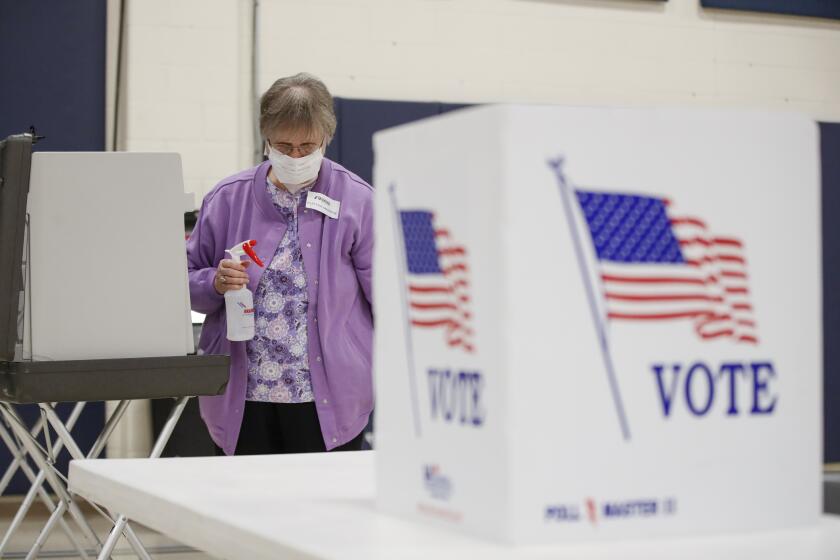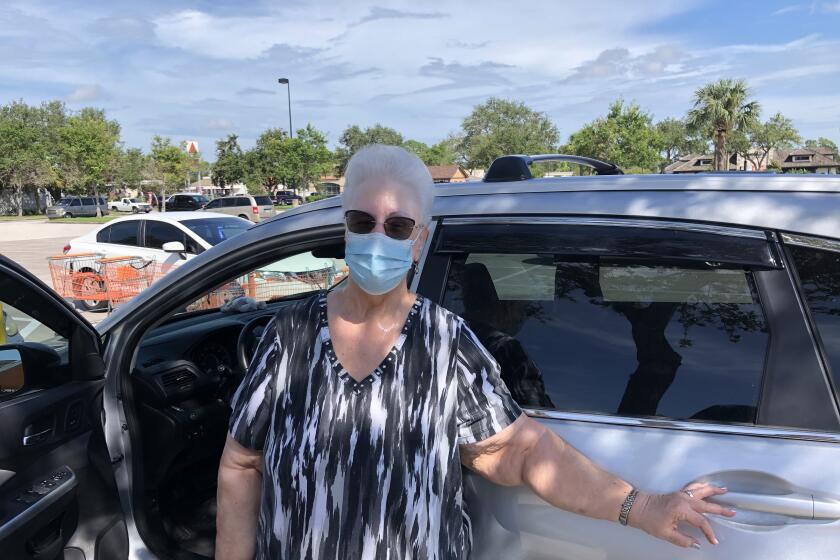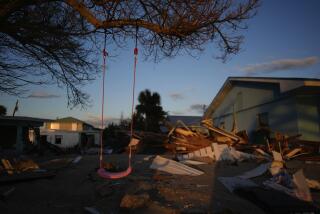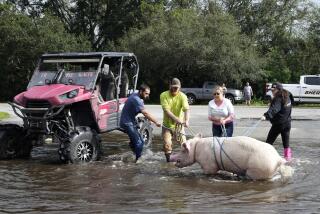Florida judge refuses to extend voter registration deadline despite computer meltdown
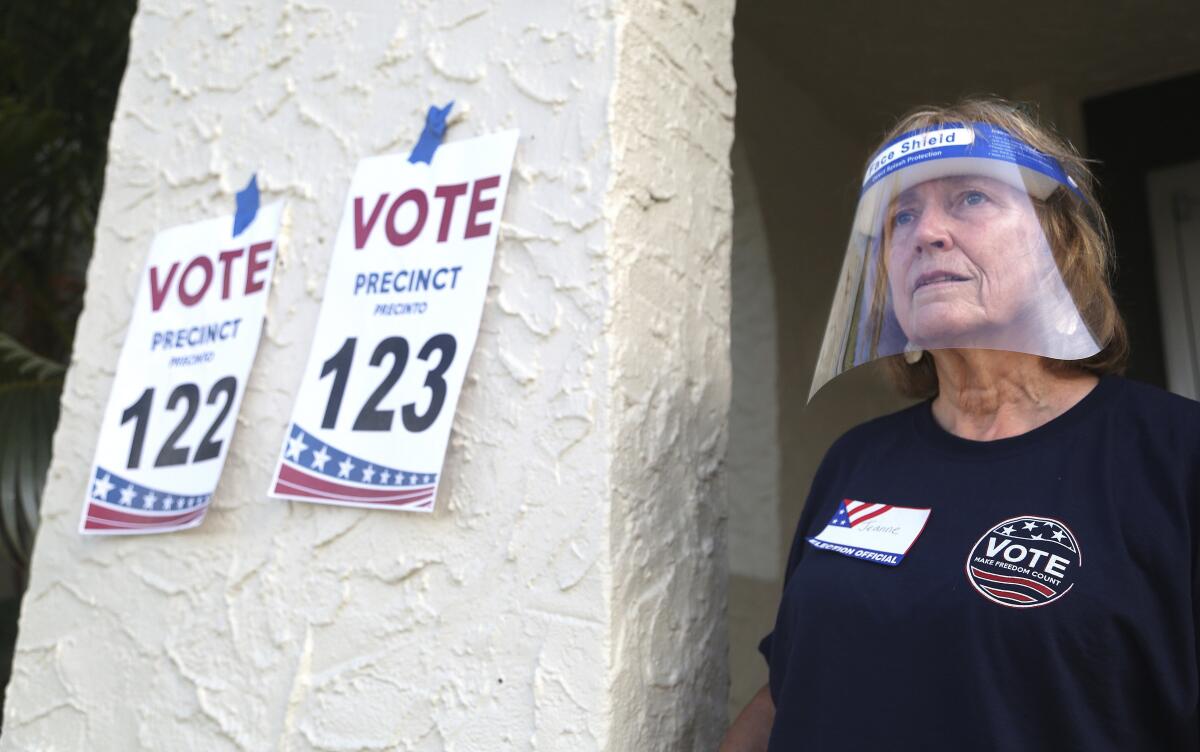
- Share via
TALLAHASSEE, Fla. — A federal judge has denied a motion to extend voter registration in Florida even though a computer meltdown on the final day of registration might have prevented thousands of potential voters from taking part in November’s presidential election.
In a 29-page ruling on Friday morning, U.S. District Court Judge Mark E. Walker said his decision was “an incredibly close call” but added that “the state’s interest in preventing chaos in its already precarious — and perennially chaotic — election outweighs the substantial burden imposed on the right to vote.”
Walker noted the historical problems that the state seems to have with elections.
“Notwithstanding the fact that cinemas across the country remain closed, somehow, I feel like I’ve seen this movie before. Just shy of a month from election day, with the earliest mail-in ballots beginning to be counted, Florida has done it again,” Walker wrote.
Monday was the final day for potential voters to register for the November presidential election. In the wake of the computer slowdown, Secretary of State Laurel Lee reopened the registration for seven hours Tuesday, after consulting with Gov. Ron DeSantis.
Data filed by the state indicates that 50,000 people registered during the extended time period. Based on previous trends, the judge noted, perhaps more than 20,000 additional people might have also registered to vote if they had been able to access the system.
The federal appeals court move on absentee ballots in Wisconsin is a win for Republicans who have fought attempts to expand voting across the country.
Walker faulted a state lawyer’s argument that other venues were available to register to vote, including in person at an elections office or by mail.
“With the public sounding the alarm, the secretary of state decided to implement a half-measure,” Walker wrote. “She hastily and briefly extended the registration period and ordered Florida’s supervisors of election to accept applications submitted by the secretary’s new ‘book closing’ deadline.”
Walker wrote that Lee’s “cure” had at least one major flaw: She did not notify the public until — at the earliest — after noon on the date of her new deadline.
“This left less than seven hours for potential voters to somehow become aware of the news and ensure that they properly submitted their voter registration applications, all while also participating in their normal workday, school, family, and caregiving responsibilities,” Walker wrote.
COVID-19’s spread in Florida jeopardizes Trump’s reelection prospects in the crucial battleground state.
The final day of the registration period is historically one of the busiest, as thousands of people register, request replacement voter cards or update addresses and other voter information to be sure their ballots will be counted.
Lee, who oversees the voting system, said her office had installed additional computer servers in anticipation of the heightened interest, but misconfigurations in the system prevented it from handling the surge.
Florida’s chief information officer, James Grant, told the Associated Press that “the servers were configured in a way that reduced its capacity to a fraction of a fraction of what it was capable of,” and, while denying people opportunities to vote was not their intention, he acknowledged that the system failed on a critical day.
The secretary of state’s office said the system was overloaded by some 1.1 million requests per hour. During the peak of the slowdown, about 49,000 people were trying to access the system — many trying repeatedly to register without success.
Some gave up and never returned despite Lee’s decision to reopen the registration period, said Cloe Cabrera, a representative for Organize Florida, one of the groups that sued the state. Many might not have learned of the next day’s extension, she said.
“We’re disappointed that so many Floridians were disenfranchised because of the state’s failure to upkeep the online voter registration system,” Cabrera said.
“A lot of folks who went to the website, which crashed, didn’t go back to the website and they won’t be able to exercise their democracy, which is very upsetting,” she said.
Dream Defenders, New Florida Majority, LatinoJustice PRLDEF and other groups that joined the lawsuit in Tallahassee said at least two additional days were needed to give citizens enough time to respond. Anything less would amount to voter suppression, they said.
The groups were considering an appeal, but with election day now less than four weeks away, that option might be impractical and sow further chaos into an election season already hampered by the coronavirus outbreak.
Florida’s online voter registration system serves the state’s 67 counties and became operational in October 2017. It has had a few hiccups over the years, but nothing like what happened Monday.
In the last seven hours of Monday, only about 8,100 people successfully accessed the system. Earlier in the day, more than 70,000 Floridians had been able to log on before the system slowed to a crawl at about 5 p.m.
A spokesman for DeSantis, Fred Piccolo, told the AP on Friday that “the governor took quick and decisive action to ensure voter access to multiple registration options including online, in person, or through the mail. There was no basis for federal courts to get involved and the governor expected this outcome.”
The judge said that the issue boiled down to whether Lee’s failure to maintain a fully functional voter registration website in the final hours of the voter registration period, and her limited deadline extension, “pass constitutional muster.” Ultimately, he said, the need to prevent more chaos outweighed the denial of voting rights for thousands of Floridians.
In the end, the case is not about Floridians missing registration deadlines or a challenge to a state statute, Walker wrote.
“This case is about how a state failed its citizens,” Walker wrote. “In this case, potential voters attempted to perform their civic duty, to exercise their fundamental right, only to be thwarted, once again, by a state that seemingly is never prepared for an election.”
More to Read
Get the L.A. Times Politics newsletter
Deeply reported insights into legislation, politics and policy from Sacramento, Washington and beyond. In your inbox twice per week.
You may occasionally receive promotional content from the Los Angeles Times.
